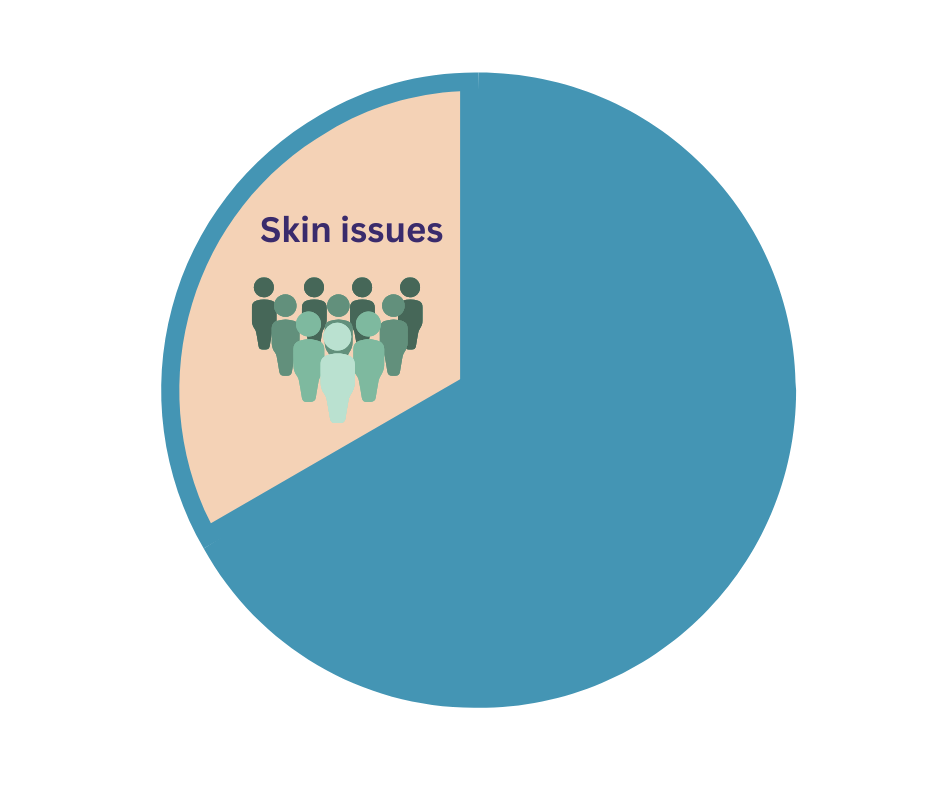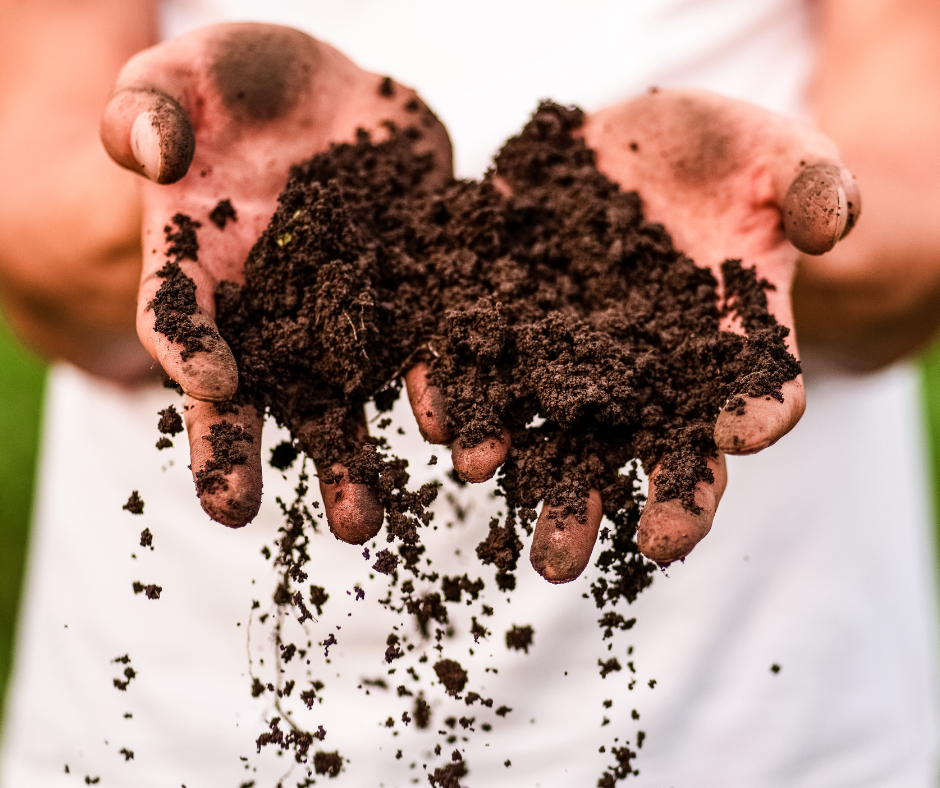
WHY ARE CHRONIC SKIN DISEASES ON A SHARP RISE?
Learn the real truth behind a massive increase in long-term skin issues in the last decade!
Skin diseases are the fourth most common human disease worldwide, affecting almost one-third of the world’s population, affecting more than 900 million people worldwide!

Common chronic or long-term skin diseases (non-transmittable) include Acne, Atopic dermatitis (also called eczema), Psoriasis, Rosacea, Melasma, and Vitiligo.
Skin diseases pose a significant threat to patients’ well-being, mental health, ability to function, and social participation, a criterion of disability defined broadly by the WHO.
Several skin diseases are associated with long-term disfigurement, disability, and stigma.
More than 30% of patients dealing with skin issues have accompanied anxiety & depression.
A person dealing with a chronic skin issue has a significant threat to his well-being, mental health & social involvement.

According to CDC, A disability means a physical or mental impairment that “substantially limits your daily activities of living & social interaction .”
How does that apply to skin issues like eczema or Psoriasis?
A chronic skin condition that results in raw, painful plaques all over your body?
Severe pruritis (itch), uncomfortable plaques, edema, anxiety, and depression can be responsible for sleep issues, sexual dysfunction, and limitation on daily life, work, and sports activities.
Patients dealing with chronic skin issues are often embarrassed to enjoy a good social life and often have their work or school performance hampered too!
If your skin issue is severe enough to prevent you from living your life as you would otherwise, it is disabling!
However, the point to understand is that It’s not only chronic skin issues that are on a sharp rise; in fact, all chronic health issues have risen sharply in the last decade.
According to the World Economic Forum, chronic diseases represent more than half the global disease burden!
One in three adults lives with more than one chronic condition or multiple chronic conditions (MCC).
It has been calculated that, in 2001, chronic diseases contributed approximately 60% of the 56.5 million reported deaths worldwide and about 46% of the global disease burden.
Today, approximately 133 million Americans – nearly half the population – suffer from at least one chronic illness; this is 15 million higher than just a decade ago; by 2030, this number is expected to reach 170 million!

Look at some FACTS about CHRONIC SKIN ISSUES
- There were more skin disease claims across the US population in 2013 than cardiovascular disease, diabetes, or end-stage renal disease.
- Skin disease impacts the entire healthcare system.
- Of the $75 billion spent on skin disease in 2013 in the US, more than $10 billion was on over-the-counter skin treatment products.
- Patients with skin disease and their caregivers experienced $11 billion in lost productivity.
- Nearly 25% of the population aged 0 to 17 years had a diagnosed skin disease, burdening families.
Skin issues by numbers
Acne
- Acne is the most common skin condition in the United States, affecting up to 50 million Americans annually.
- In 2013, the costs associated with the treatment and lost productivity among those who sought medical care for acne exceeded $1.2 billion.
Atopic Dermatitis
- One in 10 people will develop atopic dermatitis during their lifetime.
- It affects 25 percent of children and 2 to 3 percent of adults.
Psoriasis
- Approximately 7.5 million people in the United States have Psoriasis.
Rosacea
- Rosacea is a common skin disease that affects 16 million Americans.
- In 2013, the costs associated with the treatment and lost productivity among those who sought medical care for rosacea was $243 million.
As discussed, there is a massive increase in chronic or long-term skin diseases, but
what are the possible reasons behind this when we have access to the best medical care?
Let’s look at the top 7 explanations
1: Low microbe exposure

We live in an era where we are continuously advised to protect ourselves & our children from dust, mud, dirt, or any kind of unclean surroundings, as we can get sick!
While maintaining basic hygiene is not bad, but this is majorly an issue of the urban lifestyle plus the recent pandemic situation.
All these measures of taking extra precautions to keep ourselves clean and carrying a bottle of sanitizer in your bag are creating a terrible impact on microbe exposure.
It’s important to understand that exposure to germs and bacteria is not naturally bad for us; this is how our immune system learns to deal with different kinds of pathogens & hence becomes stronger.
Ironically, while parents try to protect infants and young children from bacteria for long-term immunity, microbial exposure is the most important during the earliest periods of life.
Our Skin is home to millions of bacteria, fungi, and viruses that compose the skin microbiota.

The “hygiene hypothesis,” proposed by Strachan in 1989, implies that a reduced exposure to microbes through modern health practices can lead to increased inflammatory diseases in the urbanized society.
The most critical time for germ exposure begins in utero and ends at school age.
The reduction in microbial diversity is associated with an altered immune response, facilitating the development of skin diseases, such as atopic dermatitis, Psoriasis, acne vulgaris, dandruff, and even skin cancer.
2: Diet

Nutrition and diet affect not only your Skin but your overall health.
Even the founder of modern medicine, Hippocrates, stated:
“Let medicine be thy food, and let food by thy medicine. “
The association between low nutrient, high-fat western diet can lead to inflammation in the body has already been observed.
A new mouse study published in the Journal of Investigative Dermatology has demonstrated that a Western diet (high saturated fats and sugars) can exacerbate IL-23‒mediated autoimmune disease, leading to long-term skin diseases of inflammatory nature like Psoriasis, eczema, acne, etc.
As inflammation plays a crucial role in developing autoimmune skin conditions such as Psoriasis, reducing inflammation in the body is critical.
Foods with anti-inflammatory properties comprise colorful fruits and vegetables and healthy fats in oily fish, green vegetables, nuts, flaxseed, avocado, and extra virgin olive oil.
Vitamin deficiency impacts skin health, Deficiencies in vitamin D, A, and zinc may also contribute to skin disorders, so if you are on a restricted diet, seek out foods that include these nutrients; you can find more information in this blog I wrote earlier.
Preserve & feed good to your resident microbe population – Eat probiotic foods & have pre + probiotic supplements if needed.
3: Antibiotics Usage

Antibiotics can be a lifesaver when needed; however, because of their consistent use, utility, and availability, they can be overused in medical practice.
The continuously increasing risk of antibiotic resistance remains an essential concern for skin health, as antibiotics can deplete the Skin & gut’s healthy microbial flora.
A study in the UK reported that any course of an antibiotic before the age of 2 years was associated with a doubling of the risk of hay fever and eczema, mainly if the antibiotics contained cephalosporins and macrolides.
Bengt Björkstén (Award winner Swedish Immunology researcher) has proposed that the antibiotic effect could be linked to the influence on gut bacterial colonization in the early years of development.
So, it is essential to restrict the usage of antibiotics – oral or topical to avoid the long-term skin issues & resistance they may generate.
4: Over sanitization & PPE USE

For almost three years now, the world has been swarmed by COVID-19.
During this pandemic, PPE, gloves & google use, and hygiene measures (hand sanitizer gels, hand washing) have been mandatory.
A former study demonstrated that more than one-third of healthcare workers complained of acne, facial itching, and even dermatitis from wearing an N95 mask.
The prolonged contact with masks and goggles may cause various cutaneous diseases, ranging from contact and pressure urticaria or contact dermatitis to aggravation of pre-existing dermatitis.
WHO suggests proper and frequent hand washing to prevent the spread of pandemic diseases and to be protected from infections.
Although hand washing with soap is ideal, products containing ethanol are used when water is not readily available. Those who use alcohol-based hand-washing products have increased skin problems.
Although gloves are important, wearing them for a long time can disrupt the epidermal barrier, and when the Skin becomes irritated, it is more sensitive to allergens and other irritants.
Because of these protective types of equipment, Skin cannot breathe for long periods, and moisture is retained, leading to skin barrier defects.
Moreover, Excessive hand-washing also causes dermatitis, and Folliculitis is most likely a result of occlusion caused by PPE use.
Multiple studies have noted that pre-existing skin diseases such as increased acne flares, seborrheic dermatitis, and rosacea have also been worsened with PPE use.
Multiple factors can be behind these exacerbations, including increased psychological stress and obstruction of the Skin by PPE use.
So, what to do?
People who work or live in healthcare settings who absolutely need to wear protective wear could:
- Avoid prolonged PPE use & Give yourself & your Skin breathing time in between by taking the PEE gears off during break times.
- Avoid using hot water, as this makes Skin even more, drier & depletes the natural skin oils.
- Frequently moisturize with natural products like coconut oil.
- Reduce the alcohol hand sanitizer use; wash hands with soft natural soap as much as possible.
5: Harsh skin products

Cleansing is an essential aspect of any skincare since it removes unwanted dirt, soil, and bacteria from the Skin and removes dead surface cells, preparing the Skin to better absorb topically applied drugs/medication.
However, it is crucial to understand that a mild soap functions by binding to dirt and organic material; antiseptic soaps contain specific bactericidal active ingredients that eliminate microorganisms, both pathogenic and beneficial.
An ideal cleanser should do all these without damaging or irritating the Skin; on the contrary, it should try to keep the skin surface moist.
Harsh Soaps and detergents may aggravate pre-existing tendencies to skin barrier dysfunction and promote skin inflammation in susceptible individuals.
Thus, a mild cleansing agent is essential to maintain skin health & management of various skin conditions.
According to a study published in Skin Pharmacology and Physiology, Cleansing agents such as harsh soap with a higher pH may damage the Skin’s natural antimicrobial defenses and lead to skin issues.
Frequent hand-washing should also be avoided as this leads to progressive depletion of surface lipids resulting in deeper action of detergents into the superficial skin layers.
6: Psychology

Psychodermatology (Psycho + Dermatology) is the study of the relationship between mental health and skin health.
Psychodermatology has gained recognition amongst the western community only in the past few years; however, Psychodermatology is not something new; in fact, it has been used by holistic medicine practitioners since ever.
The origin of Psychodermatology in India can be traced to Buddha’s period (circa 563-483 BC). There is mention of Buddha’s chief attendant’s sister suffering from a debilitating and socially embarrassing skin disease. Buddha treated her by teaching her how to control her emotions, especially anger (to which he linked the condition), through controlling her mind. This is the first reported practice of Psychodermatology in South Asia.
Traditional medical systems, such as Ayurveda, Homeopathy, Yoga, and Unani, promote skin disease management through herbal medications, meditation, exercise, and mindfulness practices.
The Skin is a susceptible organ. It presents the most extensive interface with our environment, it’s exposed to a broader range of stressors than any organ, and that is happening 24 * 7 throughout our entire life. The Skin is very well-innervated, and we have many nerve endings there. It sends a high volume of signals to the sensory cortex in the brain.
People with chronic skin problems like Psoriasis, atopic dermatitis or eczema, alopecia, urticaria, herpes simplex, vitiligo, lichen planus, and acne suffer from higher levels of depression, anxiety, and negative emotions associated with their skin condition.
So what do you do?

- Practice deep breathing, Yoga, and mindfulness – join some classes if you need to.
- Talk to your counselor/doctor/friend, or anyone you trust about what you are feeling… let your emotions vent out, as this is critical for your healing.
- Exercise & Workout – Start with practicing a hobby like cycling/ running/ boxing, etc., which you like; set up a fixed time every day and practice it. This will help you detoxify & engage in a positive habit.
- Maintain a routine sleep plan to give enough rest to your body & mind; this is vital for recovery.
- Take some me time – Read a book/ make some artwork/ listen to music, or do something for yourself.
7: Lifestyle, Genetic & Environmental Factors

Numerous other factors like Diet, Hygiene, Addictions, Genetic Susceptibility, BMI, associated co-morbidities, where you live, etc., have a significant impact on your immune system & commensal microbiota hence your skin health.
Alcohol & Smoking have a severe bad impact on your skin health & can aggravate your pre-existing skin condition.
Stay hydrated Drinking plenty of water helps flush toxins from the body and keeps you hydrated.
As discussed, chronic Skin issues, which have been there for over a few weeks, need to be handled holistically.
Our body works as a whole, so the treatment must also be planned to cover all aspects, not just one.
If you are dealing with a chronic skin disease and are looking for a natural & holistic treatment, I can help you- check out the information here.
REFERENCES
https://onlinelibrary.wiley.com/doi/10.1111/jocd.14266
https://www.ncbi.nlm.nih.gov/pmc/articles/PMC5718374/
https://www.aad.org/media/stats-numbers
https://onlinelibrary.wiley.com/doi/full/10.1111/bjd.19704
https://onlinelibrary.wiley.com/doi/10.1111/j.1365-2133.2012.10830.x
https://www.jaad.org/article/S0190-9622(17)30017-8/fulltext
https://www.commonwealthfund.org/publications/newsletter-article/study-chronic-disease-increased-25-percent-over-last-decade
https://www.healthcentral.com/article/eczema-and-disability-understand-your-rights
https://www.cdc.gov/ncbddd/disabilityandhealth/disability.html
https://pubmed.ncbi.nlm.nih.gov/10193389/
https://www.ncbi.nlm.nih.gov/pmc/articles/PMC4918254/
https://www.ncbi.nlm.nih.gov/pmc/articles/PMC7916842/
https://pubmed.ncbi.nlm.nih.gov/15248843/
https://www.ncbi.nlm.nih.gov/pmc/articles/PMC3088928/#ref4
https://www.ncbi.nlm.nih.gov/pmc/articles/PMC3088928/
https://research.com/u/bengt-bjorksten
https://www.sciencedirect.com/science/article/abs/pii/S0738081X18301846?via%3Dihub
https://pubmed.ncbi.nlm.nih.gov/30446197/
